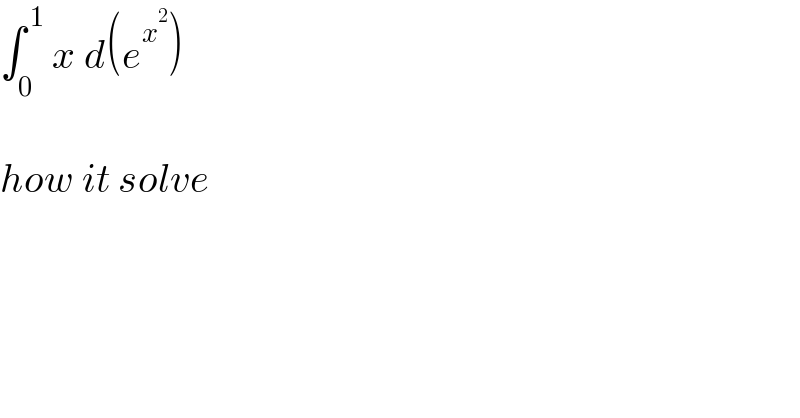
Question and Answers Forum
Question Number 151738 by tabata last updated on 22/Aug/21

Answered by Olaf_Thorendsen last updated on 22/Aug/21
![I = ∫_0 ^1 xd(e^x^2 ) I = [xe^x^2 ]_0 ^1 − ∫_0 ^1 e^x^2 dx I = e−((√π)/2)[erfi(x)]_0 ^1 I = e−((√π)/2)erfi(1) erfi(z) = (2/( (√π)))Σ_(n=0) ^∞ (z^(2n+1) /((2n+1)n!)) I = e−Σ_(n=0) ^∞ (1/((2n+1)n!))](Q151740.png)
Commented by Olaf_Thorendsen last updated on 22/Aug/21

| ||
Question and Answers Forum | ||
Question Number 151738 by tabata last updated on 22/Aug/21 | ||
 | ||
Answered by Olaf_Thorendsen last updated on 22/Aug/21 | ||
![I = ∫_0 ^1 xd(e^x^2 ) I = [xe^x^2 ]_0 ^1 − ∫_0 ^1 e^x^2 dx I = e−((√π)/2)[erfi(x)]_0 ^1 I = e−((√π)/2)erfi(1) erfi(z) = (2/( (√π)))Σ_(n=0) ^∞ (z^(2n+1) /((2n+1)n!)) I = e−Σ_(n=0) ^∞ (1/((2n+1)n!))](Q151740.png) | ||
| ||
Commented by Olaf_Thorendsen last updated on 22/Aug/21 | ||
 | ||